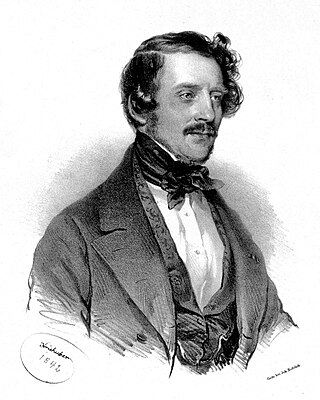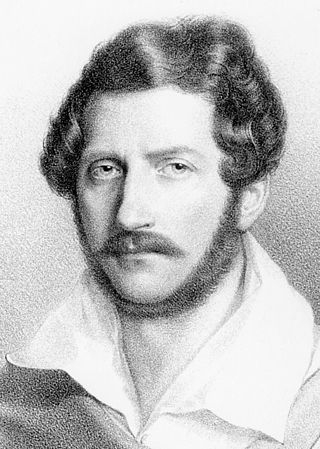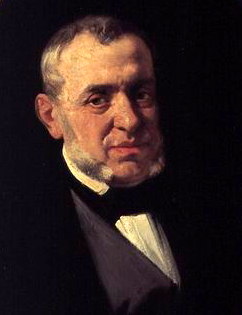
Caterina Cornaro ossia La Regina di Cipro is a tragedia lirica, or opera, in a prologue and two acts by Gaetano Donizetti. Giacomo Sacchero wrote the Italian libretto after Jules-Henri Vernoy de Saint-Georges' libretto for Halévy's La reine de Chypre (1841). It is based on the life of Caterina Cornaro, Queen of Cyprus from 1474 to 1489. It premiered at the Teatro San Carlo, Naples on 12 January 1844.

Ugo, conte di Parigi is a tragedia lirica, or tragic opera, in two acts by Gaetano Donizetti. Felice Romani wrote the Italian libretto after Hippolyte-Louis-Florent Bis's Blanche d'Aquitaine. It premiered on 13 March 1832 at La Scala, Milan.

Marino Faliero is a tragedia lirica, or tragic opera, in three acts by Gaetano Donizetti. Giovanni Emanuele Bidera wrote the Italian libretto, with revisions by Agostino Ruffini, after Casimir Delavigne's play. It is inspired by Lord Byron's drama Marino Faliero (1820) and based on the life of Marino Faliero (c.1285-1355), the Venetian Doge.

Maria Padilla is a melodramma, or opera, in three acts by Gaetano Donizetti. Gaetano Rossi and the composer wrote the Italian libretto after François Ancelot's play. It premiered on 26 December 1841 at La Scala, Milan. The plot is loosely based on the historical figure María de Padilla, the mistress of Pedro the Cruel, King of Castile.

Torquato Tasso is a melodramma semiserio, or "semi-serious" opera, in three acts by Gaetano Donizetti and based on the life of the great poet Torquato Tasso. The Italian libretto was written by Jacopo Ferretti, who used a number of sources for his text, including works by Giovanni Rosini, Goethe, Goldoni and Lord Byron, as well as Tasso's actual poetry. It premiered on 9 September 1833 at the Teatro Valle, Rome.

Adelaide di Borgogna, ossia Ottone, re d'Italia is a two-act opera composed by Gioachino Rossini to a libretto by Giovanni Schmidt. It was premièred at the Teatro Argentina in Rome on 27 December 1817.

Torvaldo e Dorliska is an operatic dramma semiserio in two acts by Gioachino Rossini to an Italian libretto by Cesare Sterbini, based on the novel/memoir Les Amours du chevalier de Faublas (1787–1790) by the revolutionary Jean-Baptiste Louvet de Couvrai, whose work was the source of the Lodoïska libretto set by Luigi Cherubini (1791), and Lodoiska set by Stephen Storace (1794), and Simon Mayr (1796).

Ricciardo e Zoraide is an opera in two acts by Gioachino Rossini to an Italian libretto by Francesco Berio di Salsa. The text is based on cantos XIV and XV of Il Ricciardetto, an epic poem by Niccolò Forteguerri.

L'equivoco stravagante is an operatic dramma giocoso in two acts by Gioachino Rossini to an Italian libretto by Gaetano Gasbarri. It was Rossini's first attempt at writing a full two-act opera.

Ciro in Babilonia, ossia La caduta di Baldassare is an azione sacra in two acts by Gioachino Rossini with a libretto by Francesco Aventi. It was first performed at the Teatro Comunale in Ferrara during Lent, 1812. The exact date of the premiere is unknown but is believed to be 14 March. During Lent it was the custom for Italian opera houses either to close or to stage works on themes from the Bible. Ciro in Babilonia is one of two Lenten operas by Rossini and is based on the Biblical story of the overthrow of the Babylonian king Belshazzar by the Persian ruler Cyrus the Great.

Eduardo e Cristina is an operatic dramma in two acts by Gioachino Rossini to an Italian libretto originally written by Giovanni Schmidt for Odoardo e Cristina (1810), an opera by Stefano Pavesi, and adapted for Rossini by Andrea Leone Tottola and Gherardo Bevilacqua-Aldobrandini.

La cambiale di matrimonio is a one-act operatic farsa comica by Gioachino Rossini to a libretto by Gaetano Rossi. The libretto was based on the play by Camillo Federici (1791) and a previous libretto by Giuseppe Checcherini for Carlo Coccia's 1807 opera, Il matrimonio per lettera di cambio. The opera debuted on 3 November 1810 at the Teatro San Moisè in Venice. It had a run of thirteen performances at Teatro San Moisè.

Demetrio e Polibio is a two-act operatic dramma serio by Gioachino Rossini to a libretto by Vincenzina Viganò-Mombelli. The opera was orchestrated for flute, oboes, clarinets, basson, horns, trumpets, and strings.

Bianca e Falliero, ossia Il consiglio dei tre is a two-act operatic melodramma by Gioachino Rossini to an Italian libretto by Felice Romani. The libretto was based on Antoine-Vincent Arnault's 1798 play Les Vénitiens, ou Blanche et Montcassin.

Sancia di Castiglia is an Italian opera seria in two acts by Gaetano Donizetti to a libretto by Pietro Salatino. It was first performed at the Teatro San Carlo in Naples on 4 November 1832, conducted by Nicola Festa.

Orazi e Curiazi is an opera by the Italian composer Saverio Mercadante. It takes the form of a tragedia lirica in three acts. The libretto, by Salvadore Cammarano, is based on the Roman legend of the fight between Horatii and Curiatii. It was first performed at the Teatro San Carlo, Naples, on 10 November 1846.

Adelia, o La figlia dell'arciere is an opera in three acts by Gaetano Donizetti. The Italian libretto was written partly by Felice Romani and by Girolamo Maria Marini, a part-time poet who had achieved notability the previous year with Otto Nicolai's Il templario. The opera premiered at the Teatro Apollo, Rome on 11 February 1841.

Il giovedì grasso is a farsa in one act by Gaetano Donizetti, from a libretto by Domenico Gilardoni. The literal translation of the title is "Fat Thursday", a reference to Carnival celebration. The libretto was adapted from the French comedies Monsieur de Pourceaugnac by Molière and Le nouveau Pourceaugnac by Charles-Gaspard Delestre-Poirson and Eugène Scribe. The opera uses spoken dialogue rather than recitatives, and the buffo role is given in the Neapolitan language. The work premiered at the Teatro del Fondo in Naples on 26 February 1829.

Una follia is a farsa in one act by composer Gaetano Donizetti. The work premiered on 15 December 1818 at the Teatro San Luca in Venice. The opera uses the same Italian-language libretto by Bartolomeo Merelli after August von Kotzebue's Der Graf von Burgund that Donizetti used for his Enrico di Borgogna a month earlier, but with different music. It was given one performance and "never performed again, and its score has never been found."

Il borgomastro di Saardam is an 1827 melodramma giocoso in two acts by Gaetano Donizetti. The libretto, by Domenico Gilardoni, was based on the 1818 play Le bourgmestre de Sardam, ou Les deux Pierres by Mélesville, Jean-Toussaint Merle and Eugène Cantiran de Boirie. Albert Lortzing's 1837 opera Zar und Zimmermann is ultimately based, via a German translation, on the same French play. The plot concerns a famous episode in the life of Peter the Great, in which he disguised himself under an assumed name as a worker in the shipyards of Saardam, and has certain similarities to Donizetti's earlier 1-act farce Il falegname di Livonia.











